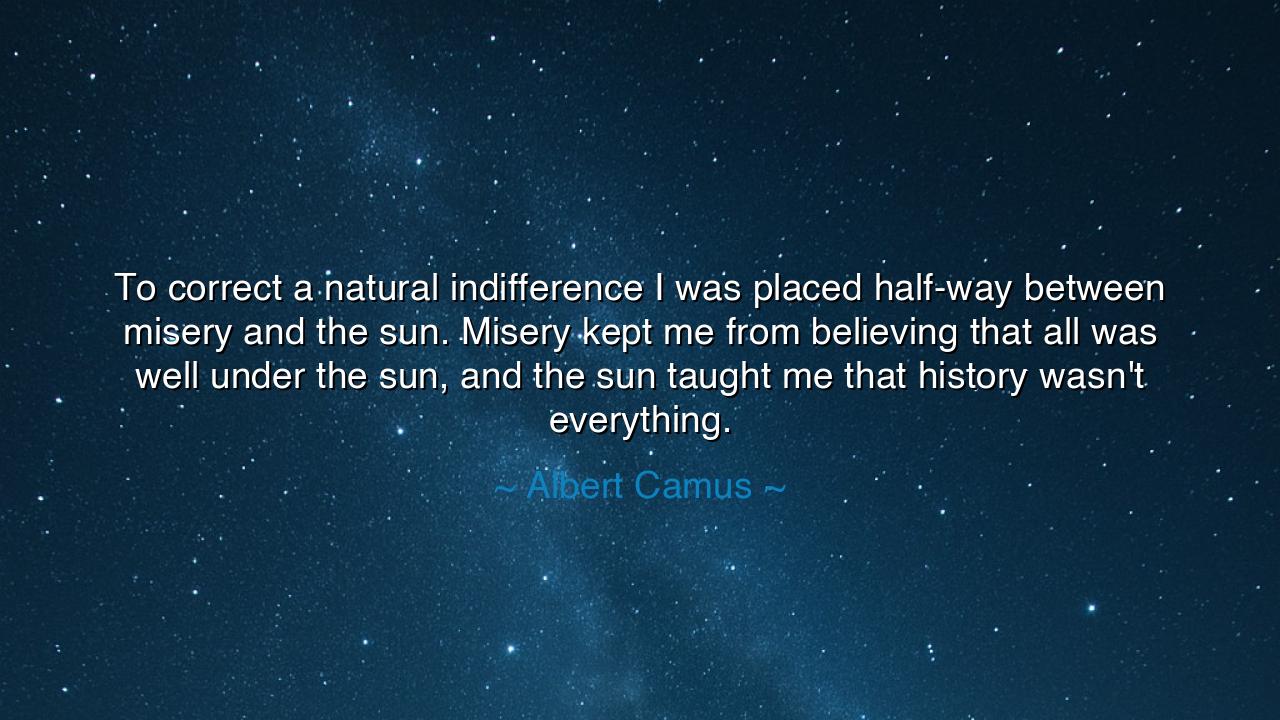
To correct a natural indifference I was placed half-way between
To correct a natural indifference I was placed half-way between misery and the sun. Misery kept me from believing that all was well under the sun, and the sun taught me that history wasn't everything.






Hearken, O children of reflection, and attend the words of Albert Camus, who spoke of the tension between human suffering and the luminous truths that illuminate existence: “To correct a natural indifference I was placed half-way between misery and the sun. Misery kept me from believing that all was well under the sun, and the sun taught me that history wasn't everything.” In these words lies a meditation upon the duality of life, the lessons of despair and joy, and the recognition that human understanding is shaped as much by suffering as by illumination.
Camus, philosopher of the absurd and observer of the human condition, reflects upon the interplay of misery and revelation. Misery, in its many forms, awakens the soul to the imperfections of the world. It reveals the limits of human endeavor, the weight of injustice, and the fragility of life. It is in misery that one learns the necessity of action, the reality of suffering, and the humbling truth that history—recorded deeds and events—is insufficient to capture the fullness of existence.
Yet, Camus places himself also in the light of the sun, where illumination tempers despair. The sun teaches that life is more than the sum of history, more than a ledger of human errors and triumphs. It reminds the soul of beauty, of continuity, and of the presence of wonder and vitality that cannot be reduced to chronicles of the past. History, though instructive, is not the sole arbiter of meaning. To dwell exclusively upon it is to neglect the living immediacy of experience, presence, and perception.
Consider the devastation of post-war Europe. Millions lived in the shadow of misery, haunted by memories of conflict, loss, and displacement. Yet amid ruins, the human spirit found moments of sunlight: music, art, reconstruction, and love persisted. Survivors learned, as Camus teaches, that history records horrors, but the lived world—the sun—offers renewal, possibility, and the understanding that human life cannot be fully captured in the annals of the past alone.
Camus’ reflection is both philosophical and practical. It warns against the tyranny of history over consciousness, where the weight of past deeds may obscure the present moment. Misery anchors the mind in the record of suffering, but the light—the sun—calls forth engagement, joy, and the acknowledgment that existence transcends what is written or remembered. A balanced life, therefore, requires attentiveness both to lessons of hardship and to the vitality of the living moment.
Consider the story of Anne Frank, whose diary immortalized the misery of her time, the horrors of persecution, and the shadows of history. Yet within her words also shines a radiance, a recognition of the small joys, the beauty of nature, and the vitality of hope even amid despair. She embodies Camus’ insight: the soul placed between misery and light perceives that history is not all-encompassing, that the sun illuminates truths beyond the record of human deeds.
From this meditation emerges practical guidance: confront the realities of suffering, injustice, and failure without allowing them to harden the spirit. At the same time, seek the sunlight of experience, beauty, and joy, allowing the living world to temper despair. Learn from history, but do not be enslaved by it; let it inform your actions, but do not let it obscure the vitality of presence, perception, and immediate experience. Wisdom arises from navigating both shadows and light.
Thus, remember: life is a balance between misery and illumination, between the lessons of history and the truths of the living moment. Albert Camus teaches that human understanding is forged in the tension between shadow and sun. Engage with the world fully, absorb the lessons of suffering, celebrate the light of existence, and recognize that history, though instructive, is not everything. Walk between misery and the sun, and let both shape your journey with insight, courage, and wonder.
If you wish, I can also craft a more dramatic, audio-ready version, vividly illustrating post-war Europe, Anne Frank’s diary, and Camus’ philosophy to make his message emotionally resonant for listeners. Do you want me to do that next?






AAdministratorAdministrator
Welcome, honored guests. Please leave a comment, we will respond soon